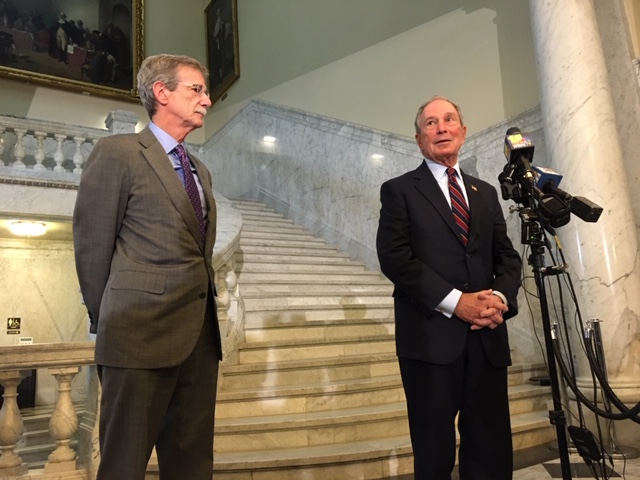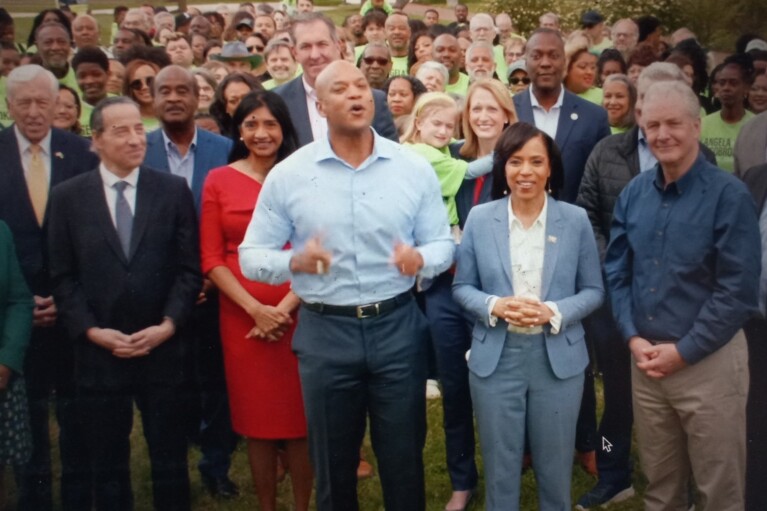Bloomberg Wades Into Hopkins Police Controversy (And So Does Frosh)

Former New York Mayor Michael Bloomberg waded into the debate over Johns Hopkins University’s request to create a new police force on Tuesday, telling reporters in Annapolis that the current approach to safeguarding the school’s Baltimore campuses and its hospital buildings is “irrational” given the city’s struggle to reduce crime.
An outspoken advocate for reducing gun violence and the founder of a prominent gun safety organization, Bloomberg met for about half an hour with Attorney General Brian E. Frosh (D) and a small group of state lawmakers — committee chairs and other leaders — in the State House.
At a news conference afterward, he told reporters that allowing Hopkins, a private institution – and his alma mater – to create its own armed police force would benefit the school and the hospital.
“When you have a city that has the murder rate that Baltimore has, I think it’s ridiculous to think that [campus officers] shouldn’t be armed,” Bloomberg said.
“Particularly if it’s something that has been done in every other university and the other hospitals, it’s kind of irrational not to have it at the hospital and the university that represents the biggest group of employees in the state and the City of Baltimore.”
Bloomberg’s voice carries weight in Baltimore political and civic circles.
A philanthropist and possible candidate for president in 2020, he has donated $3.35 billion to Hopkins, whose School for Public Health bears his name. Bloomberg graduated from JHU in 1964.
His most recent contribution, $1.8 billion in late 2018, is believed to be the largest philanthropic gift ever made to an institution of higher learning in the U.S. The donation means that no student who gains admission to Hopkins will have to decline due to an inability to pay tuition.
After a spasm of violence in late 2017, Johns Hopkins University’s president, Ronald J. Daniels, spent two weeks traveling the country with key aides, looking at how other large urban schools protect their campuses, the Baltimore Sun reported.
The result was state legislation late in the 2018 session that failed to gain traction and was quickly abandoned. The university is trying again this session.
In endorsing the push for an armed police force, Bloomberg said he was also motivated by concerns for the safety of security personnel now working for the school.
“Police officers devote their lives to helping us. But they do have families and they want to go home to their families,” he said. “And I think trained police officers, who are well managed and well supervised, is the right thing to do.”
While no legislation has been introduced yet to enable Hopkins to establish its own police force, lawmakers expect a bill to be dropped soon. The proposal is already generating controversy among some community groups and political leaders. State Sen. Mary L. Washington (D-Baltimore City), whose district borders on Hopkins’ Homewood campus, even referenced her opposition while delivering the Senate’s annual tribute to the late Rev. Martin Luther King Jr. on Monday night.
“When we lay a wreath on the troubled waters that are this Maryland General Assembly, we do so knowing full well that over 90 days we are called to be the angels who make the way safe not just for the first but for all the children and families of our districts,” Washington said. “To stand in the way of a government shutdown; to stand in the way of the privatization and militarization of police forces in our urban centers.”
State Sen. William C. Ferguson IV (D-Baltimore City), one of the seven lawmakers who met with Bloomberg Tuesday, said the former mayor referenced the Hopkins police debate but did not lobby the legislators to support it.
Asked, after Bloomberg spoke to reporters, whether he’d support a private police force for the university, Frosh said he’s inclined to.
“I lean toward the view that Baltimore and Hopkins would benefit from safe streets and campuses around Hopkins,” he said.
In an interview, state Sen. Antonio L. Hayes (D-Baltimore City) reflected the ambivalence some city officials feel about the proposal.
“I could argue both sides,” he said.
Asked whether Bloomberg’s vocal endorsement could impact the debate over a Hopkins police force, Hayes laughed.
“Unless Bloomberg just registered to vote in the 40th District in the last 24 hours, it doesn’t move me,” he said.
Bloomberg’s Annapolis visit
Bloomberg was in Maryland to deliver the Forrestal Lecture Tuesday evening at the 2019 Naval Academy Leadership Conference. Frosh said the former mayor’s aides called his office to set up a meeting with lawmakers earlier in the day.
In addition to Ferguson, Bloomberg’s meeting with Sens. Paul G. Pinsky (D-Prince George’s), James C. Rosapepe (D-Prince George’s), and William C. Smith Jr. (D-Montgomery), and Dels. Maggie L. McIntosh (D-Baltimore City), Kathleen M. Dumais (D-Montgomery) and Luke Clippinger (D-Baltimore City).
Ferguson called the session “interesting” and “very, very informal.” The former mayor discussed the initiatives being championed by the nonprofit he formed, Everytown for Gun Safety, and approaches Maryland has taken to reduce gun crime, he said.
In his remarks with reporters, Bloomberg expressed support for legislation to ban print-at-home 3-D guns. “It’s very hard to control who prints them and who gets them,” he said.
He expressed disappointment with the partial shutdown of the federal government, calling it “dangerous” and “a disgrace.”
“Management is not an entry level job,” he said, in a not-so-veiled swipe at President Trump. “And if you have somebody that doesn’t know how to be a good governor or mayor or president, you don’t want them learning on the job. You want people who are proven.”
Bloomberg’s presence in the State House caused a major stir. While he was inside the building meeting with Frosh and legislators, two black SUV’s with New York license plates idled in front of the capitol – one of them parked in the space reserved for House Speaker Michael E. Busch (D-Anne Arundel).
Bloomberg is a Democrat-turned Republican-turned independent-turned Democrat. He apparently did not reach out to Gov. Lawrence J. Hogan Jr. (R) while he was in town – even though Hogan is the kind of moderate Republican Bloomberg once backed regularly.
Bloomberg reminded reporters that he has said he would decide whether to seek the Democratic presidential nomination in “January or February.”
“It’s still January,” he noted.





 Creative Commons Attribution
Creative Commons Attribution